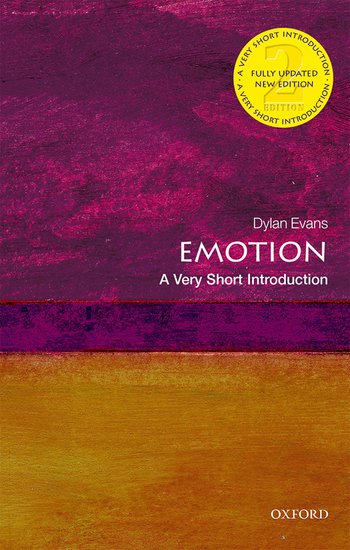Home >
A Very Short Introduction >
Emotion (2nd edition) (Philosophy)
A Very Short Introduction | Philosophy
Emotion (2nd edition)
ISBN: 9780198834403
Series: A Very Short Introduction
Emotion (2nd edition) (Philosophy)
A Very Short Introduction Emotion (2nd edition) (Philosophy) Media > Books > Non-Fiction > Education Books Expect Delays of Up to 4 Weeks| Order Below |
ISBN
9780198834403 (10-digit ISBN: 0198834403)
- Description
- Key Features
- Series Description
- Table of Contents
- Offers an entertaining and accesible introduction to the latest thinking about emotions
- Draws on a wide range of scientific research, from anthropology and psychology to neuroscience and artificial intelligence
- Discusses the evolution of emotions and their biological basis
- Illustrated with entertaining examples from fiction, film, and popular culture
- New sections address the neural basis of empathy and the emotional impact of films
Was love invented by European poets in the Middle Ages or is it part of human nature? Will winning the lottery really make you happy? Is it possible to build robots that have feelings?
In this Very Sort Introduction Dylan Evans explores these and many other intriguing questions in this guide to the latest thinking about the emotions. Drawing on a wide range of scientific research, from anthropology and psychology to neuroscience and artificial intelligence, Evans takes the reader on a fascinating journey into the human heart, discussing the evolution of emotions and their biological basis, the science of happiness, and the role that emotions play in memory and decision making. Greeted by critics as a pop science classic when it was first published in 2001, the book has now been thoroughly revised and updated to incorporate new developments in our understanding of emotions, including new sections addressing the neural basis of empathy and the emotional impact of films.
Oxford's Very Short Introductions series offers concise and original introductions to a wide range of subjects--from Islam to Sociology, Politics to Classics, Literary Theory to History, and Archaeology to the Bible.
Not simply a textbook of definitions, each volume in this series provides trenchant and provocative--yet always balanced and complete--discussions of the central issues in a given discipline or field. Every Very Short Introduction gives a readable evolution of the subject in question, demonstrating how the subject has developed and how it has influenced society. Eventually, the series will encompass every major academic discipline, offering all students an accessible and abundant reference library.
Whatever the area of study that one deems important or appealing, whatever the topic that fascinates the general reader, the Very Short Introductions series has a handy and affordable guide that will likely prove indispensable.
Please note: As this series is not ELT material, these titles are not subject to discount.
1: The universal language
2: Why Spock could never have evolved
3: Short cuts to happiness
4: The head and the heart
5: The computer that cried
Further reading
Index
Was love invented by European poets in the Middle Ages or is it part of human nature? Will winning the lottery really make you happy? Is it possible to build robots that have feelings?
In this Very Sort Introduction Dylan Evans explores these and many other intriguing questions in this guide to the latest thinking about the emotions. Drawing on a wide range of scientific research, from anthropology and psychology to neuroscience and artificial intelligence, Evans takes the reader on a fascinating journey into the human heart, discussing the evolution of emotions and their biological basis, the science of happiness, and the role that emotions play in memory and decision making. Greeted by critics as a pop science classic when it was first published in 2001, the book has now been thoroughly revised and updated to incorporate new developments in our understanding of emotions, including new sections addressing the neural basis of empathy and the emotional impact of films.
Key Features
- Offers an entertaining and accesible introduction to the latest thinking about emotions
- Draws on a wide range of scientific research, from anthropology and psychology to neuroscience and artificial intelligence
- Discusses the evolution of emotions and their biological basis
- Illustrated with entertaining examples from fiction, film, and popular culture
- New sections address the neural basis of empathy and the emotional impact of films
Series Description
Oxford's Very Short Introductions series offers concise and original introductions to a wide range of subjects--from Islam to Sociology, Politics to Classics, Literary Theory to History, and Archaeology to the Bible.
Not simply a textbook of definitions, each volume in this series provides trenchant and provocative--yet always balanced and complete--discussions of the central issues in a given discipline or field. Every Very Short Introduction gives a readable evolution of the subject in question, demonstrating how the subject has developed and how it has influenced society. Eventually, the series will encompass every major academic discipline, offering all students an accessible and abundant reference library.
Whatever the area of study that one deems important or appealing, whatever the topic that fascinates the general reader, the Very Short Introductions series has a handy and affordable guide that will likely prove indispensable.
Please note: As this series is not ELT material, these titles are not subject to discount.
EASY ORDER FORM
PRICES LISTED INCLUDE CONSUMPTION TAX
Price Before Tax:
¥1,790


